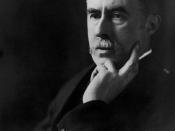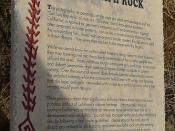Alfred Edward Housman was a poet who focused primarily on writing about the fleetingness of love and the decay of youth (Abcarian 1534). In his poem "When I Was One-and-Twenty" he expresses his thoughts about the fleetingness of love.
In the opening lines of the poem Housman speaks of a young man who recalls a time when he was the age of twenty-one and how he was warned by a wise man not to give his heart away. The young man quotes the wise man as saying, "Give crowns and pounds and guineas / But not your heart away" (3/4). In this quote the wise man warns him that, though you need money to buy necessities for life, being poor is far better than suffering the pain of lost love or living after having given your heart away.
The young man goes on to quote the wise man as saying, "Give pearls away and rubies / But keep your fancy free" (5/6).
Here the young man is being advised to go beyond giving away just money. The wise man advises him to give away precious, expensive items such as pearls and rubies in order to keep his heart free. This suggests that a person's heart is more valuable than any of their prized possessions, such as pearls or rubies, and it should be guarded very carefully. However, despite the advice he received, the young man admits that when he was twenty-one he was not in the habit of listening or taking advice from wiser, experienced people.
As the poem continues, the young man remembers that he was warned more than once. He recalls being told that "The heart out of the bosom / Was never given in vain (11/12); for if it was " 'Tis paid with sighs...


